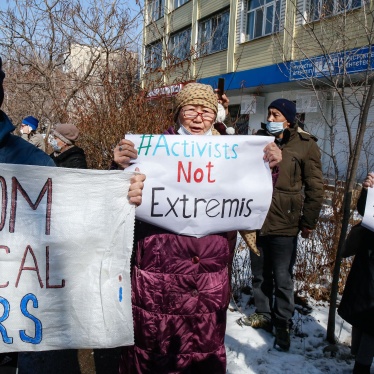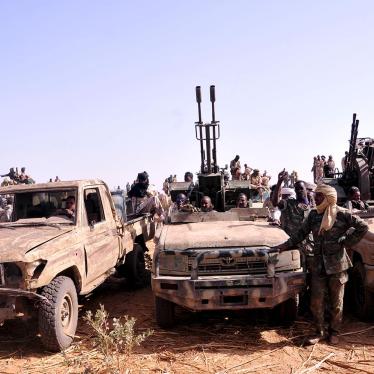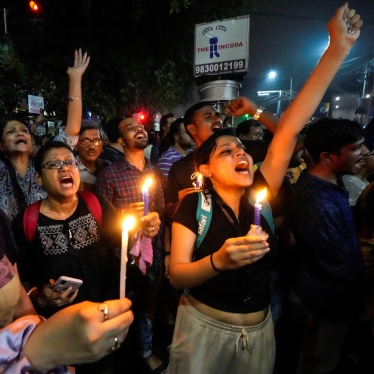(Paris)–French authorities should bring to justice those responsible for the horrific attack on the office of Charlie Hebdo on January 7, 2015, Human Rights Watch said today. The authorities should guard against backlash against French Muslims and ensure that their broader response protects human rights.
The attack in Paris during an editorial meeting of the satirical magazine left 12 people dead, including two police officers. A dozen people were injured, four of them in very critical condition. It was the most deadly attack in France since 1961.
“This appalling crime is an effort to limit freedom of expression and an attack on those who celebrate free speech,” said Izza Leghtas, Western Europe researcher at Human Rights Watch. “The response should be to bring those responsible to justice by way of a fair trial, and to protect media workers from violence and Muslims from reprisal.”
The authorities have identified two brothers, Said and Cherif Kouachi, as the main suspects. A major police operation has been created to search for them. On the morning of January 8 in southern Paris, a man shot another police officer, who has since died of her injuries. Bernard Cazeneuve, the minister of the interior, has announced that the latest incident does not appear to be linked to the attack on Charlie Hebdo.
Charlie Hebdo is famous for its controversial depictions of the Prophet Muhammad and for reprinting derogatory cartoons about the prophet that had been published by the Danish newspaper Jyllands-Posten in 2006. The Charlie Hebdo offices were firebombed in 2011, and staff have received multiple threats. A police officer had been assigned to the chief editor, Stephane Charbonnier, for his protection. Both were killed in the January 7 attack.
Nothing can justify the horrific attack against Charlie Hebdo and the police officers, Human Rights Watch said. A core element of the right to freedom of expression under human rights law is the right to express opinions that offend, shock, or disturb. The French authorities should continue to uphold and promote this freedom, as should other governments around the world, including by providing security so that journalists can carry out their work.
Based on video footage of the attack, two armed men fleeing the scene shouted the words “Allahu Akbar” (“God is Great” in Arabic) and “We have avenged the Prophet Muhammad” (”On a vengé le Prophète Muhammad”). The French Council of Muslim Faith condemned the attack, as did the president of the Conference of Imams in France.
It is essential for the French authorities to guard against any backlash against Muslims or other groups, Human Rights Watch said. Several mosques in France have been attacked since the attack on Charlie Hebdo. Cazeneuve has rightly condemned those attacks. Three grenades were thrown into a mosque in Le Mans during the night of January 7, one of which exploded without causing any injuries. Shots were fired at a Muslim prayer room, which was empty at the time, on the same evening in Port-la-Nouvelle, southern France, media reported. An explosion damaged the façade of a kebab restaurant close to a mosque in Villefranche-sur-Saone on the morning of January 8, without causing any casualties. After the gruesome murder of a British soldier, Lee Rigby, in Woolwich, south London, in May 2013, attacks against Muslims across the UK soared.
Prime Minister Manuel Valls has rightly warned against hatred, intolerance, and conflations that could be made following the attack. The French authorities should ensure that Muslims and others are not targeted for reprisals, and investigate any such incidents. The authorities should assess the security risks around mosques, Muslim prayer rooms, and other places that are vulnerable to such attacks across France, and provide reinforced security as necessary.
While the French authorities should continue their search for those responsible for the attacks and hold them accountable for their acts, the authorities should not use this attack to adopt any new measures in the name of counterterrorism that would undermine human rights.
France already has very broad powers in this area. In November 2014 parliament passed a new counterterrorism law that expands those powers even further, without sufficient safeguards against abuses.
The new law allows the authorities to ban French nationals from leaving the country if they are suspected of traveling abroad to participate in terrorist activities, or of posing a threat to public safety after they return from a place where terrorist groups operate. The law also created a new offense of an “individual terrorist undertaking,” a vaguely worded offense that could lead to people facing such criminal charges for conduct that is not clearly described in the law as unlawful.
Human Rights Watch research has found that the pre-existing and broadly defined offense of “criminal association in relation to a terrorist undertaking,” has led to charges and convictions on the basis of weak and circumstantial evidence.
The new French law is part of a wider European policy response to fears that citizens of European countries may travel to Iraq or Syria to join the extremist group Islamic State (also known as ISIS) or other groups and then return to Europe to carry out attacks. A counterterrorism bill before the UK parliament includes new measures aimed at curbing so-called foreign fighters that could breach guarantees of free movement, family life, and free expression. Germany, Netherlands, Denmark, and Norway are pursuing or considering policies to strip citizenship or restrict their citizens’ free movement.
Valls has confirmed that several arrests have been made in relation to the attack on Charlie Hebdo. While it remains unclear on what grounds those arrests have been made, the French authorities should ensure that the rights of all detainees are fully respected, and that anyone charged with an offense enjoys the full range of due process rights.
“At this time of shock and mourning, France should set an example of tolerance and uphold the freedoms it promotes,” Leghtas said. “Freedom of expression should not be weakened by this attack, nor should any other human rights.”






